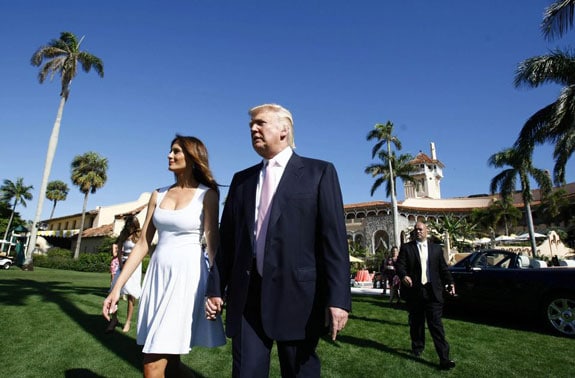Is Justice Department helping Trump cover up Constitutional violation?
Developments on Day 239 of the Trump Administration:
Trump Resorts Charges Government $546/Night for Stay by Official
The Trump Administration refuses the release of visitor lists at Donald Trump’s Florida resort Mar-a-Lago, as it is revealed that the complex charged a Government official $546 per night for his stay.
Defying a federal court order, the Justice Department declined to provide the names on Friday. Instead it released a State Department list of just 22 names — all of them members of the Japanese Prime Minister’s delegation who visited Mar-a-Lago in February.
The Citizens for Responsibility and Ethics in Washington has said that, after July’s order by Judge Katherine Polk of the Federal District Court in Manhattan, it would soon be receiving the visitor logs. CREW and the Knight First Amendment Institute sued in April for a list of people explicitly visiting Trump and not all Mar-a-Lago members or other guests.
Acting Attorney General Chad Readler wrote CREW on Friday:
The remaining records that the Secret Service has processed in response to the Mar-a-Lago request contain, reflect, or otherwise relate to the president’s schedules. The government believes that presidential schedule information is not subject to FOIA [Freedom of Information Act.
CREW said it will maintain the legal challenge.
Meanwhile, the Justice Department’s decision raised more question about a possible conflict of interest between Trump’s business and his Presidency.
On Friday researcher Ryan Shapiro, who specializes in obtaining information through FOIA, released a document showing that Mar-a-Lago had charged a Government official $1,092 for a two-night stay.
Shapiro’s Property of the People also obtained receipts showing payments by the US Embassy to Trump’s hotel in Panama and by unnamed federal employees to Trump’s hotels in Washington and Las Vegas. All payments were made on government credit cards.
Receipts released today showing federal charge cards were used at Trump properties in Mar-a-Lago, Panama and Vegas https://t.co/syQM3VFXlw pic.twitter.com/dl2bQjYEwV
— april glaser (@aprilaser) September 15, 2017
The Domestic Emoluments Clause of the Constitution, bans the President from receiving payments from state or federal governments, apart from his salary.
Trump’s lawyers have insisted that the payments are “a value-for-value exchange” and not an emolument. The Justice Department claims hotel transactions are business transactions, unrelated to the President’s office.
Trump Inaugural Committee Breaks Pledge to Give to Charity?
Donald Trump’s inaugural committee, which raised an unprecedented $107 million for a “workmanlike” ceremony, shows no sign of fulfilling a pledge to give leftover funds to charity.
Nearly eight months later, the group has helped pay for redecoration of the White House and the Vice President’s residence — but not a cent has been given to charitable causes.
Tom Barrack, the chairman of the private Presidential Inaugural Committee, said recently that donations to charity “surely will exceed any previous inauguration”, but will have to wait until the end of November, when the committee will publicly disclose details about its finances.
But Barrack told the AP in June that “a full and clean external audit” had already “been conducted and completed”, although the committee would not provide a copy or say who performed it.
Two “Trump associates familiar with efforts to sort out the financing” said they were unaware of a completed audit. Three said there is ongoing confusion about how much money is left after January’s events.
Justice Department to Scale Back Obama-Era Review of Police
The Justice Department says it will limit Obama-era efforts to review local police departments and issue public reports.
The department’s Office of Community Oriented Policing Services, or COPS, is halting a years-long effort which complemented the civil rights division’s “pattern or practice” enquiries of police departments. The Department said COPS will return to advice for police departments on best practices, offers of training, and promotion of collaboration.
Attorney General Jeff Sessions, who is seeking a more pro-police approach, said the move is “a course correction to ensure that resources go to agencies that require assistance rather than expensive wide-ranging investigative assessments that go beyond the scope of technical assistance and support”.
Last month, Sessions reversed the Obama Administration’s restriction of shipments of military surplus gear to police departments. The limits were introduced after police clashes with demonstrators in Ferguson, Missouri in 2014, following the police killing of the unarmed teenager Michael Brown.
Vanita Gupta, the former head of the Justice Department’s civil rights division who is now President of the Leadership Conference on Civil and Human Rights, said the latest decision is “another indication of the full retreat from police reform by Jeff Sessions”.
The move affects about 14 police departments nationwide that had either begun receiving public reports from COPS or expected to receive such reports soon.

